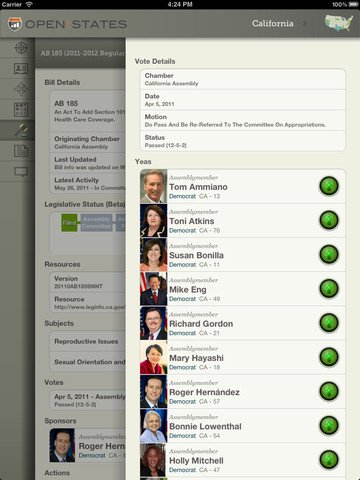This page originally appeared at https://sunlightfoundation.com/2012/03/12/open-states-50/ but has been replicated here for posterity.
Three years ago at PyCon 2009, we had the first PyCon Open Government Hackathon. Our big project was Open States (then the 50 State Project). The goal was to begin scraping state legislatures’ websites in the hope of providing a common format for bill metadata across all 50 states.
Today, as we kick off the 4th Annual Open Government Hackathon at PyCon we’re extraordinarily happy to announce one of the most significant milestones in the history of Open States: as of today, all 50 states (as well as DC and Puerto Rico) are now supported via our API and bulk downloads. This makes Open States the first and only completely open, completely free resource for accessing legislative information in a uniform format across all 50 states.
This is a proud day for all of us here and for everyone who has contributed to the project. Over the past three years Open States has grown to be much more than we’d envisioned and a great deal of that is due to great suggestions, contributions, and uses by the entire Open States Community. It is no coincidence that Open States has become Sunlight’s most contributed-to open source project; we needed the community to make this project happen, and over 40 of you have answered the call.
Open States On Your Phone

We’re also proud to announce Open States iOS. Open States for iOS is an application for iPads and iPhones developed by long time friend of the project Greg Combs with support from the Minnesota Historical Society’s NDIIPP initiative.
The application allows you to browse all of the Open States data: bills, legislators, committees, district maps, and in a select few states, schedules and maps of the state house. By giving the application permission to access your location you can find out who represents you, see how they’re voting on bills you care about and check out basic contact information where available.
All of this is powered by the Open States API, so as we improve our data offerings the data in the application will improve as well. If you have an iOS device, head to the app store and download it now!
Android users, don’t fret: the bulk of the Open States team is sporting Android devices and we’re looking forward to seeing an Android application just as much as you are.
Who’s Using The Data?
Our API has received more than 34 million hits since we launched a year and a half ago with 5 states.
One of our favorite uses to date is NPR’s StateImpact. They’ve developed a WordPress plugin that pulls in Open States data to make neat widgets that add relevant bill and legislator data to blog posts.
You can also check out a novel use by Joe Germuska (this post previously credited another Tribune employee/friend of Open States, Brian Boyer) at the Chicago Tribune. He utilized our code to aid in a report on pension codes.
The Minnesota Historical Society has made use of our data standards work in a different way to produce a whitepaper on best practices for legislatures to follow.
What’s Next?
While today is a great day, it doesn’t mean we’re going to start slacking off (ok, maybe for a day or two).
We have a lot ahead of us:
- Our next big task is an overhaul of OpenStates.org. We’re going to be building a public website based on all of the data we’ve collected that’ll connect citizens with their state legislature.
- As mentioned, we’ve just started to discuss an Android application and hope to have some news on that front soon.
- We’re currently working on features involving bill text including full text search, one of our most frequently-heard requests. We’re also excited to see how this work can lead to more work in linking together related bills — see Ryan Sibley’s recent article on ultrasound bills for an example of that work in action.
- The nature of our work is ongoing, state sites change and we have to change with them. We also continue to improve and expand our support in states. Our current data quality intern, Nina, has been churning away adding data quality issues to our issue tracker. (If you care to contribute that’d be a great place to start.)
- We’re always looking for ideas of what we should do next. Join our Google Group to keep up with what we’re doing and chime in on what you’d like to see.
We’re extremely excited to have reached this stage and we can’t wait to show you what we’ve been working on next. We hope you’ll consider giving our API a try and sharing what you come up with. And as always, to stay up to date on the latest Open States news follow @openstates on twitter.